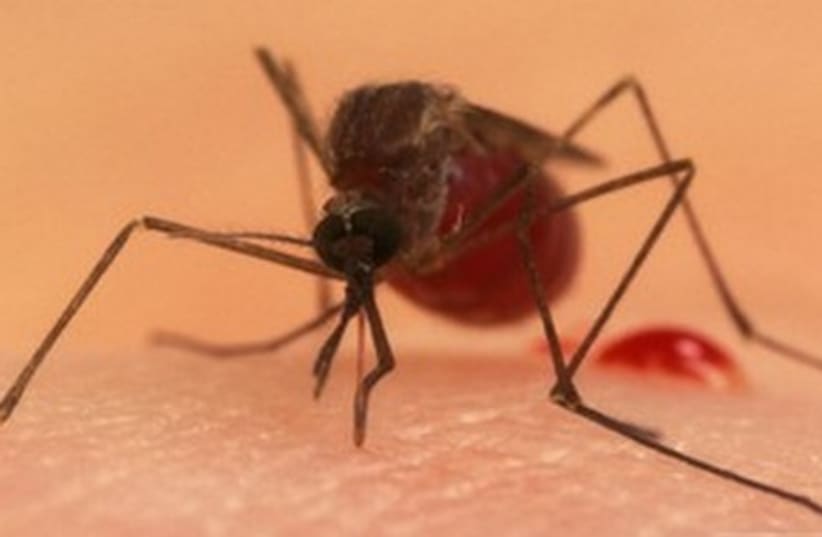How does a mosquito bite turn into an infection, and what can be done to prevent this complication – and insect bites in general?
S.Y., Holon Dr. Adi Klein, head of the pediatric emergency department at Hillel Yaffe Medical Center in Hadera, replies:High temperatures and humidity – along with bodies of standing water – are the perfect conditions for the spread of mosquitoes in our region, and among the main sufferers are young children and infants. In the past month, more than 30 children have arrived at our emergency room with infected mosquito bites. They usually develop a fever and inflamed lymph glands. They need intensive treatment, but all of the children are in good condition.Even when the local authorities spray against mosquitoes, many survive, and during trips, while sleeping at night, at picnics or at the sea, it’s hard to avoid them.Children are much more sensitive to mosquitoes than adults. There are chronic skin conditions such as “asthma in the skin,” which is actually a form of atopic dermatitis, also known as eczema, which involves a predisposition to being overly sensitive to allergens. Skin sores can quickly become infected. Children with even a local sensitivity and not in skin all over their body can react significantly with redness, swelling and itching.Often, the mosquito bite creates an allergic reaction, and sometimes there is an infection. One can try to differentiate between the two according to the time difference: An infection develops only about 24 hours after the bite. But as redness, swelling and itchiness are also a reaction to allergy, determining the cause can be confusing.It’s natural to scratch itchy skin, but this causes infectious bacteria on the surface of the skin to penetrate it. These microbes are naturally found on the skin and cause no problems there, but when they penetrate lower layers, they cause a local infection and significant swelling and redness.If the infection spreads through the body, the patient can end up in the hospital.In addition to ordinary bacteria, another type, called Streptococcus group A, can spread quickly and cause infection in the soft tissues. This can cause the child’s condition to deteriorate rapidly.Mosquitoes cause most bites, but other insects, including ticks and flies, can also cause problems. If a patient is hospitalized, blood tests and cultures are taken find out what bacteria are involved. If the child was in contact with a dog, it may be that he was infected by a tick.When a young child suffers a mosquito or other insect bite the first thing to due is to apply anti-histamine cream. Make sure the child’s fingers and nails are clean to avoid infection from scratching. If the situation requires going to the hospital, it will usually require anti-allergy medications and oral antibiotics, but if the child can’t take enough pills orally to overcome the infections, intravenous infusions are necessary.Preventing exposure to mosquitoes, for example by wearing long-sleeved, light clothing and anti-mosquito preparations, installing screens and eliminating standing water (even in a pail), is the best way to deal with the problem.I am a 71-year-old man who had a heart condition and suffered from hypertension. I get medication for the high blood pressure. I am going on vacation next month to a fancy hotel with a luxurious spa. I was wondering whether I can safely use the Jacuzzi and sauna or not. I.T., Beersheba Judy Siegel-Itzkovich comments: The Hebrew-language Israeli Journal of Family Practice had an article not too long ago by Dr. Nir Livyatan, a family medicine specialist from the Haifa and western Galilee regions, which dealt with this issue. He wrote that bathing in very warm water or being in a place of intense heat, like a sauna, can cause the blood vessels to expand and the blood pressure to drop. Theoretically at least, using a Jacuzzi or sauna could cause problems in heart disease and hypertension patients.One study he cited showed that one can stay in a Jacuzzi for up to 10 minutes without risk, even if suffering from these chronic conditions and taking medications for them. Another study stated that 15 minutes in a Jacuzzi could be considered safe for such patients if they were fit enough to exercise, while a third said that hypertensives or heart patients who are stable can use a sauna safely.The American Heart Association has issued an advisory saying that hot tubs and saunas “pose no risk to healthy people as long as they are not misused.People with high blood pressure should tolerate saunas well as long as they are not experiencing a hypertensive crisis...If your doctor has told you to avoid moderate exercise, you should also be careful when considering hot tubs and saunas. People with high blood pressure should not move back and forth between cold water and hot tubs or saunas. This could cause an increase in blood pressure. Drinking alcohol and using a sauna isn’t a good combination either, so don’t mix the two.”Thus Livyatan concludes that 10 or 20 minutes in a Jacuzzi is safe for people with stable coronary disease and blood pressure. If patients are told by their doctors to avoid moderate physical activity, he recommends avoiding hot tubs and saunas.In any case, consult your doctor about your individual case.Rx for Readers welcomes queries from readers about medical problems. Experts will answer those we find most interesting.
Write Rx for Readers, The Jerusalem Post, POB 81, Jerusalem 91000, fax your question to Judy Siegel-Itzkovich at (02) 538- 9527, or e-mail it to jsiegel@jpost.com, giving your initials, age and place of residence. ■
